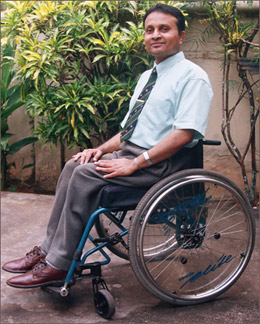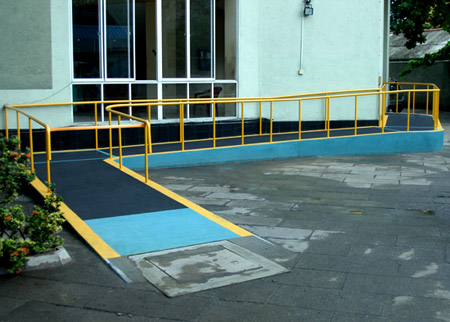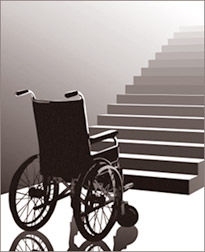|
October 14 is World Standards Day:
Standards enable 'accessibility for all'
An imperative national need :
By Dr. Ajith C. S. PERERA
|

Dr. Ajith C. S. PERERA |
Accessibility in daily life is at the core of this year's theme for
World Standards Day - 'Standards make the world accessible for all'.
Life is all about accessibility to buildings and technology (based on
information and communication) and everyday products that provide what
we need and desire in daily life.
Accessibility could optimise the return on investment in these areas,
enhance equalisation of opportunities, support and sustain quality of
life and even enable disabled persons and the elderly in all spheres of
society.
Anybody at any stage in life can experience temporarily reduced
accessibility. When that happens, simple everyday activities should
never become complicated or a safety hazard.
Advantages would also be felt by pregnant women, children, those
carrying heavy luggage and pushing infants in prams as well as those
temporarily debilitated.
Standards make the world accessible for all - the International
Organisation for Standardisation (ISO), International Telecommunication
Union (ITU) and International Electro-technical Commission (IEC) are the
three partners of World Standards Cooperation (WSC).
 |
|
A ramp constructed according to
'standards' with the writer's guidance at the Dehiwala
Municipal Council premises, is an excellent eye opener.
Standards promote safety for all and prevent waste of
resources. |
They coordinate their work to review and examine the standards
needed, helping designers, manufacturers, policy makers and end-users to
make the world safer and more accessible for all, today and tomorrow.
For example, the Standard ISO/IEC 10779:2008 offers guidelines to
make IT office equipment friendlier for the elderly and disabled. Our
own standard in building construction SLS ISO TR 9527:2006 provides
design guidelines enabling the disabled people not only to make full use
of premises and facilities in daily life but also to be active partners
in national development.
The ISO 9001:2008 international standard specifies generic
requirements which are intended to be applicable to all organisations
regardless of type, size and product or service provided. It provides
guidelines for an organisation to demonstrate its ability consistently
to provide products or services to meet customer and regulatory
requirements and continually improve customer delight.
For their meaningful reality, establishing accessibility and
facilities become imperative. Hence in the greater national interest, in
awarding ISO 9001:2008 recognition to organisations, accessibility
should be an essential necessity.
Accessibility adds life
Nationally recognised and internationally accepted standards when
implemented rightly contribute significantly towards making
'accessibility work equally for everyone' in all these key areas.
This in turn would enable individuals to reach their full productive
potential, minimise unwanted dependency and thereby reduce colossal
wastes economically and socially and promote physical and psychological
well-being.
It was inspirational for me to witness how little changes in designs
bring significant improvements to accessibility and how this has
empowered people so as to dispel disability, diminish frustration,
transform thought processes and lifestyle and 'enable' not only
paraplegics worse than me but even quadriplegics with enhanced quality
of daily life.
Technology based products and services have surfaced to add value to
quality of daily life despite restricted abilities. They have the
potential to enable the disabled and elderly, even the housebound,
enhance their education and awareness, circumvent physical barriers,
work productively even from home, enable buying, selling and paying
utility bills, secure transmission and transaction of banking services,
add quality to daily functioning, networking to keep actively in touch
with friends, family and others who have mobility difficulties,
entertain them and thereby maintain independence.
 International Standards are drafted adhering to specific rules. They
ensure environments; technology, products, services and systems are
cost-effective and time efficient, commercially viable, and consistently
perform the way they were intended to. International Standards are drafted adhering to specific rules. They
ensure environments; technology, products, services and systems are
cost-effective and time efficient, commercially viable, and consistently
perform the way they were intended to.
They help make life simpler and comfortable and to increase the
reliability, compatibility, interchangeability, efficiency and the
effectiveness of their use by everyone at an economical cost.
* A properly designed ramp will be really useful for a new mother
with a baby carriage.
* A device with a large switch makes things easier for someone with
an injured hand.
* A sensor stopping doors from closing could prevent accidents when a
back injury impairs movement.
* The little dot above the number 5 on a phone keypad makes it easier
to find numbers - a boon in the first days after an eye operation.
The biggest winners with standardisation are end-users. They could
compare the offers among several suppliers and asses benefits. Also, a
common standard supported by multiple suppliers offers the fewest
disadvantages and a wider choice.
Standards also help businesses target their products to growing
users. Companies would benefit from increased sales, a wider base of
delighted customers, reduced production costs, minimised wastage of
resources, improved efficiency, optimised productivity and enhanced
sustainability. Life revolves round how accessible are the buildings and
technology that's important in day-to-day life and the standards lay the
foundation to that. It determines the extent of productivity,
optimisation of human potential, safety and quality of life of people.
It is also a prerequisite to prevent waste of resources and promote
sustainable economic and social development. As such, significant
contributions towards accessibility should be an imperative criterion in
recognition of achievers at awards presentations concerning quality and
productivity.
The Sri Lanka Standards Institution (SLSI) is the recognised National
Standards Body (NSB) and sole member body from Sri Lanka in ISO.
However, SLSI is not and cannot be the enforcement and implementation
body.
Standards are not legal documents; hence they do not impose any
regulations. However, in the greater national interest, standards vital
in daily life should be included into our legislation and compliance
made compulsory. They should also more often be incorporated into legal
contracts.
Exactly a year ago, the Supreme Court also gave an order (Ref: SCFR:
221/2009) to make compliance with standards mandatory for all new public
buildings and facilities.
The people who matter (engineers, architects, investors, ministries,
authorities and departments and businessmen, as well as all end-users)
have the social responsibility, moral duty and legal obligation to
ensure they enforce compliance with the right design standards
correctly.
Verification and validation
This step is essential to ensure design standards and fulfil its
intended purposes. It also prevents waste of the country's resources.
These are two critical steps of a quality management system as ISO
9001:2008. For meaningful results validation should be performed by a
competent outside party having wide practical knowledge and proven good
understanding of the intricacies.
Before the issue of 'certificate of conformance' such validation step
is an imperative national need.
Also for a meaningful classification of our hotels, this must be an
essential prerequisite. |

